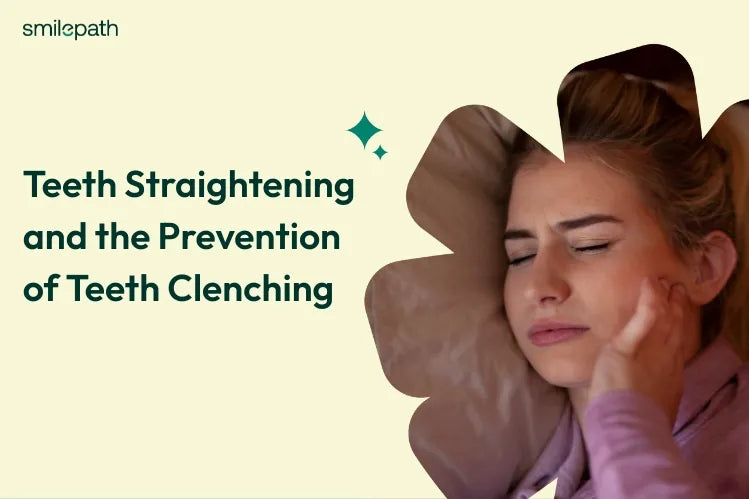
Teeth clenching, also known as bruxism, is a common condition characterized by the grinding or clenching of teeth, often involuntarily. It can lead to various dental issues and discomfort. If you're considering teeth straightening treatment, you may wonder how it can contribute to the prevention of teeth clenching. In this blog, we will explore the relationship between teeth straightening and the prevention of teeth clenching, highlighting how orthodontic treatment can help alleviate this condition and improve overall oral health.
Improved Bite Alignment
One of the primary causes of teeth clenching is an improper bite or misalignment of teeth. When your teeth are not properly aligned, it can create stress and tension in your jaw muscles, leading to clenching or grinding. Teeth straightening treatment, such as braces or clear aligners, helps align your teeth into their optimal positions, improving bite alignment and reducing the likelihood of teeth clenching.
Balanced Pressure Distribution
Misaligned teeth can create uneven pressure distribution when biting down, causing certain teeth to bear more force than others. This imbalance can contribute to teeth clenching. By straightening your teeth, orthodontic treatment helps distribute the pressure evenly across your teeth, reducing the strain on specific teeth and minimizing the risk of clenching.
Stress Reduction
Stress is a common trigger for teeth clenching. Orthodontic treatment not only improves the physical alignment of your teeth but can also positively impact your confidence and self-esteem. By achieving a straighter smile, you may experience a reduction in stress levels, which can indirectly contribute to a decrease in teeth clenching episodes.
Improved Jaw Alignment
Teeth misalignment can affect your jaw alignment, which can, in turn, contribute to teeth clenching. Orthodontic treatment aims to correct both dental and skeletal issues, helping to align your jaw properly. This improved jaw alignment can alleviate the strain on your jaw muscles, reducing the likelihood of clenching or grinding.
Enhanced Oral Health
Teeth clenching can lead to several oral health problems, including worn enamel, tooth sensitivity, and jaw pain. By preventing teeth clenching through teeth straightening, you can help preserve the health and integrity of your teeth. Straighter teeth are easier to clean and maintain, reducing the risk of decay, gum disease, and other dental complications associated with clenching.
Consultation with a Dental Professional
If you suspect you have bruxism or teeth clenching, it is important to consult with a dental professional, such as an orthodontist or general dentist. They can evaluate your condition, discuss your teeth straightening options, and recommend a comprehensive treatment plan that addresses both teeth alignment and the prevention of teeth clenching.
Conclusion
Teeth straightening plays a significant role in the prevention of teeth clenching. By improving bite alignment, reducing stress, promoting balanced pressure distribution, and enhancing jaw alignment, orthodontic treatment can help alleviate the symptoms of teeth clenching and improve overall oral health. If you are considering teeth straightening, consult with a dental professional to explore the best treatment options tailored to your specific needs and goals.
FAQs
Yes, teeth clenching can lead to various dental problems, including worn enamel, tooth fractures, jaw pain, and temporomandibular joint (TMJ) disorders. It is important to address teeth clenching to prevent further damage to the teeth and jaw.
Common signs of teeth clenching include waking up with jaw or facial pain, headaches, worn-down teeth, and jaw muscle soreness. If you suspect teeth clenching, it is recommended to consult with a dental professional for a proper diagnosis and treatment plan.
Yes, stress is a significant contributing factor to teeth clenching. High levels of stress can lead to increased muscle tension in the jaw, resulting in clenching or grinding of the teeth. Managing stress through relaxation techniques and stress reduction strategies can help alleviate teeth clenching.
Teeth clenching can occur both during sleep (known as sleep bruxism) and while awake (awake bruxism). Sleep bruxism is often involuntary and may be associated with sleep disorders, while awake bruxism can be a response to stress or tension.
Orthodontic retainers primarily aim to maintain the position of the teeth after orthodontic treatment. While they may not directly prevent teeth clenching, they can provide a protective barrier between the upper and lower teeth, reducing the impact of clenching forces on the tooth surfaces.


 Australia
Australia New Zealand
New Zealand Malaysia
Malaysia English
English Portuguese
Portuguese English
English English
English English
English English
English English
English Canada
Canada